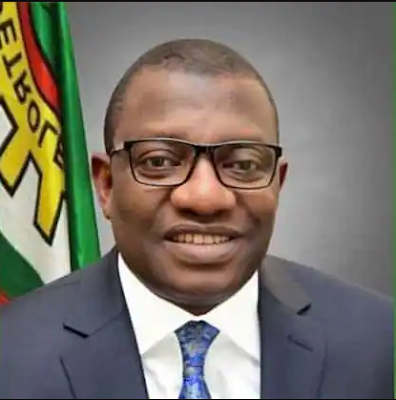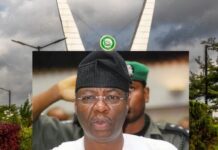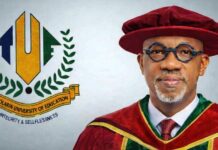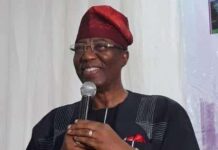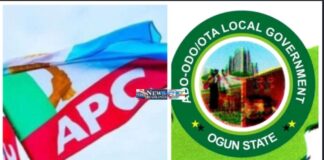FEATURED
Necessity is the regular excuse of rapscallions. It is the mephistophelean plea used to legitimize devilish deeds, like the willful maligning of upright men by hack writers.
Some staff of NAPIMS have allegedly lent themselves as tools for certain faceless individuals and ruthless fortune hunters, with intent to sabotage the nation’s oil sector, and the subsequent whitewash of their misdeeds by their propagandists. They recently embarked on a mission to malign patriotic and well-focused man, Bala Wunti who is working for the glory of the Nigeria’s oil sector.
They launched an attack against Bala Wunti, writing to harass the latter with trumped-up allegations fed to them by their malefic cohorts.
However, the enemy within should understand that those using him are the major afflictions of this country. Since their incursion into the country’s petro-business, the centre has refused to hold as the oil sector reels and caterwauls to their devious plots.
Interestingly, however, Mele Kyari and Bala Wunti are two of a kind. They are men of open trust, whose stewardship is shorn of insolence and suspicion. Some have likened them to the healing stems to the public service’s putrid branches.
The heads of the Nigerian National Petroleum Corporation (NNPC), and
National Petroleum Investment Management Services (NAPIMS) respectively have risen above juvenile credulity in the discharge of their duties. Rather than engage in a cutthroat rivalry, to the detriment of the country, they maintain a wise fidelity to national interest and the laws governing their offices. They have shunned the bewitching delusions and theories of war that set their predecessors apart.
In former days, there used to be perennial crises of trust between erstwhile heads of the National Petroleum Investment Management Services (NAPIMS) and those of the Nigerian National Petroleum Corporation (NNPC). The fact that NAPIMS is a Corporate Services Unit (CSU) in the Exploration and Production (E&P) Directorate of NNPC notwithstanding, something sinister always triggered fracas between the heads of these all-important two organisations which are central to the wealth of Nigeria.
To put this in proper perspective, the worth and success of Nigeria’s investments in her oil sector are mostly determined by the NAPIMS; as it maximizes return on investments for the country through effective supervision of the joint venture (JV) and production sharing contracts (PSC) companies among others to ensure that Nigeria’s interests are adequately covered. With a portfolio so massive and apparently juicy, there is bound to be some high-handedness from some vested interests.
In times past, if the Group Managing Director of NNPC was not accusing the Managing Director of NAPIMS of insubordination; the latter would attempt to pass a report to the President intimating him of NNPC’s overbearing and some opaque operations that muddled up NAPIMS investments. It was always a cat and dog relationship between those that headed the two organisations.
But all those seem to have paled into insignificance. All the distrust and loggerheads of the past have since been consigned to the bin of history as the two men manning the affairs of NNPC and NAPIMS operate with unprecedented mutual trust and confidence, as they are always on the same page. Mele Kyari, who was appointed by President Muhammadu Buhari as the 19th GMD of NNPC in 2019 to manage the state-run oil corporation, has been having a smooth-sailing relationship with Bala Wunti, who heads NAPIMS. Information has it that the two organisations never had it so smooth between themselves prior to the appointment of these gentlemen and technocrats in 2019.
“Neither of them has ever expressed suspicion about each other,” a source confirmed. They have always carried on without any bitterness in their hearts – not even when unscrupulous elements in the establishment attempted to cause ruckus between them by fabricating and sharing falsehoods of each to another. It has been as if both of them have sworn to an oath of dismissing tales and rumours and never allowing such to take any roots in them. Their professionalism stands them out, just as their brotherly bond has been exemplary.
Their technocratic credentials as well as their much-celebrated professional transparency have been cited as the reason for their seamless work relationship. Both have been vocal against the opacity that pervaded the running of the petroleum sector. “Between the Nigeria Extractive Industries Initiative (NEITI) – a natural resource utilisation watchdog, and the Auditor General of the Federation, dealing with the NNPC to get it to the account was distressing, the corporation hardly opened up, but with Kyari’s Transparency, Accountability and Performance Excellence (TAPE) agenda, this has changed,” a report said.
“At the outset when the Group Managing Director of the NNPC, Mallam Mele Kyari came on board with his team, what he laid before the Nigerian public was that he will be transparent and that he will engage,” Umar Ajiya, who heads NNPC’s finance and accounts department said in a report.
With Bala’s calm disposition and personal commitment to transparency and accountability, he has been able to bring NAPIMS to benefit from Kyari’s TAPE, as an outfit that manages Nigeria’s investment interests in joint venture deals in the sector. NAPIMS has leveraged Kyari’s TAPE to pursue transformation and efficiency in its operations. Its commitment has efficiently buoyed indigenous firm, First Exploration and Petroleum (E&P), to start oil production from the Anyala West field in offshore OMLs 83 and 85.
From contract renegotiation, premium payments and rate reductions, NAPIMS has also saved $1 billion for the country, while raising Nigeria’s oil reserve by 181.5mb of oil equivalent. Unit cost of production is also being pushed down further by NAPIMS to keep Nigeria competitive.
This is what happens when round pegs are positioned in round holes – the country gains and the people rejoice, most especially when such returns on investment are used to fund infrastructure like the present administration has been doing.
Kyari joined NNPC in 1991 and has served in various roles within the Corporation. In 2015, Mr. Kyari was appointed Group General Manager, Crude Oil Marketing Division, where he made a positive impact on NNPC and Nigeria with outstanding achievements that include optimally securing Federation entitlements from production/fiscal arrangements and resolution of various disputes on PSCs. He also successfully managed the Direct Sales and Direct Purchase (DSDP) arrangement of petroleum products to ensure energy security.
From championing EITI and Open Government Partnership principles, promoting the passage of the Petroleum Industry Act, declaring the Corporation’s first profit in her 44-year history and resolving the decade-long PSC disputes to unlocking the deepwater, introducing cost discipline, rehabilitating ailing refineries and other critical downstream infrastructure, deepening domestic gas utilization, public disclosure of NNPC accounts, the first in the Corporation’s history, Kyari has championed Transparency and Accountability and Performance Excellence.
Other achievements include rallying shareholders to take the FID for NLNG Train 7, transforming the Corporation into a world-class organisation and leading concerted efforts in driving environmental policies for cleaner energy. Aside from being a Fellow of the Nigerian Association of Petroleum Explorationists (FNAPE), Kyari is also Nigeria’s National Representative to the Organisation of Petroleum Exporting (OPEC) Economic Commission Board (ECB).
On the other hand, Bala Wunti is a thoroughbred oil and gas industry professional with over 30 years of experience covering Technical, Commercial, Managerial and Executive roles across the oil and gas value chain. Since joining NNPC, Bala has held several key positions in NNPC. He previously served as Managing Director, Petroleum Products Marketing Company (PPMC), Group General Manager Corporate Planning & Strategy, Senior Technical Adviser to five different Group Managing Directors of NNPC amongst others.
Bala has led some critical National Assignments including the review and amendment of the 1993 Deep Offshore Act to improve Government Take from Production Sharing Contracts, renegotiation of Production Sharing Contracts after over 2 decades of stalemate, and commercial negotiations for ~30 different LNG related agreements. He has championed several initiatives such as the “Nigasification Strategy” for powering the Nigerian economy with natural gas and condensate, the “P-PIE Initiative” for eliminating the importation of petroleum products, and more recently optimization of upstream operating costs to sub $10/bbl. Bala also has a proven track record in energy diplomacy and international coordination as Nigeria’s National Representative in the Gas Exporting Countries Forum (GECF) and Technical Member of the Organization of Petroleum Exporting Countries (OPEC) Economic Board.
Source: The Capital NG

